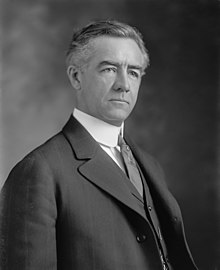Gilbert Monell Hitchcock
Gilbert Monell Hitchcock (born September 18, 1859 in Omaha , Nebraska , † February 3, 1934 in Washington, DC ) was an American newspaper publisher and politician who was a member of the US House of Representatives and between 1911 and 1923 was a US Senator from Nebraska .
Early years
Hitchcock, son of US Senator Phineas Warren Hitchcock , received his education in public schools in Omaha and at a German high school in Baden-Baden . Back in the United States, he attended the University of Michigan at Ann Arbor , where he studied law. After graduating in 1881 he started as in Omaha lawyer to work. But just four years later he turned to journalism and founded the Evening World newspaper . In 1889 he bought the Morning Herald . By merging the two papers, the Omaha World-Herald newspaper was created , which is still the largest daily newspaper in Nebraska and parts of Iowa .
Political rise
In the wake of the agricultural crisis in the Midwest , Hitchcock, whose family was traditionally Republican , ran as Democrat for the United States House of Representatives in 1898 ; however, he had to admit defeat to his competitors. He was also a supporter of William Jennings Bryan's unsuccessful presidential campaign. In 1902 Hitchcock finally succeeded in entering Congress, where he was active for a total of three legislative periods (March 4, 1903 to March 3, 1905 and March 4, 1907 to March 3, 1911). He renounced another candidacy for the House of Representatives in favor of his nomination for the Senate on January 18, 1911. As a Senator, Hitchcock represented Nebraska until March 3, 1923. There he was a member of the Committee on the Philippines , the Committee on Foreign Relations and the Committee on Forest Reservations and Game Protection .
Hitchcock was initially critical of President Woodrow Wilson . Even after the sinking of the RMS Lusitania in 1915, he did not see the role of the United States as an active military power, but proposed that reparations be demanded. But subsequently he supported Wilson's war policy in the First World War , especially after the Zimmermann telegram and Germany's resumption of submarine warfare in 1917.
After the First World War, Hitchcock declared himself to be an opponent of France's policy in the wake of the Allied occupation of the Rhineland . In this context, he expressed himself racist in particular towards the African members of the French military and described them as "savages" and "inferior". The New York Times of November 28, 1922 quotes Hitchcock as follows: "The gist of my charge is that France has quartered over 20,000 men of an inferior race, half savage, upon white people, that these men are quartered not only in barracks, but in the very houses of German citizens along the Rhine " .
Old age and death
In the elections to Congress in 1922 and 1930, Hitchcock was no longer successful. Instead, he resumed publishing in Omaha. In 1933 he ended his professional career and moved to Washington, where he died on February 3, 1934. His body was transferred to Nebraska and buried in Forest Lawn Cemetery.
Individual evidence
Web links
- Gilbert Monell Hitchcock in the Biographical Directory of the United States Congress (English)
- Gilbert Monell Hitchcock in the database of Find a Grave (English)
- Article about Gilbert Monell Hitchcock in the New York Times
| personal data | |
|---|---|
| SURNAME | Hitchcock, Gilbert Monell |
| BRIEF DESCRIPTION | American politician |
| DATE OF BIRTH | September 18, 1859 |
| PLACE OF BIRTH | Omaha , Nebraska |
| DATE OF DEATH | February 3, 1934 |
| Place of death | Washington, DC |


